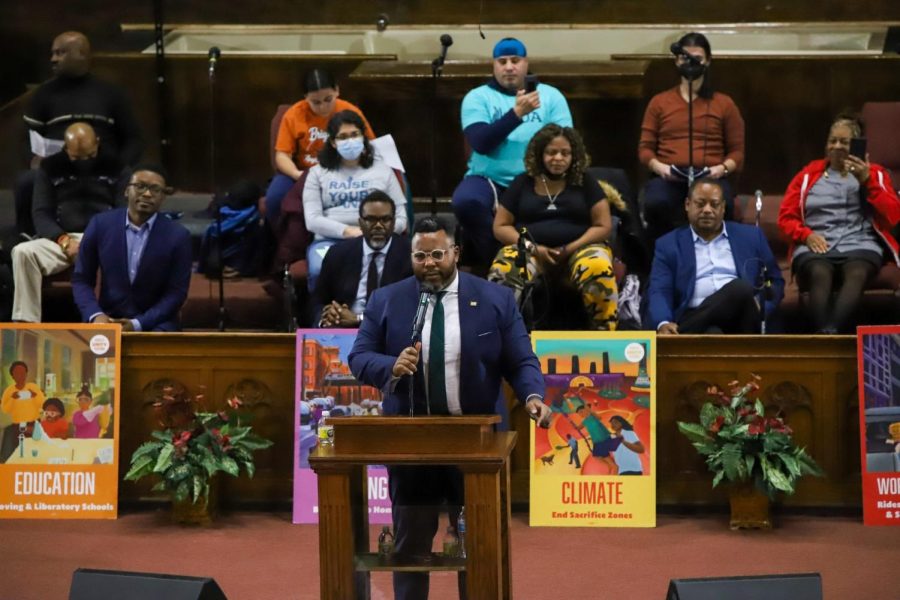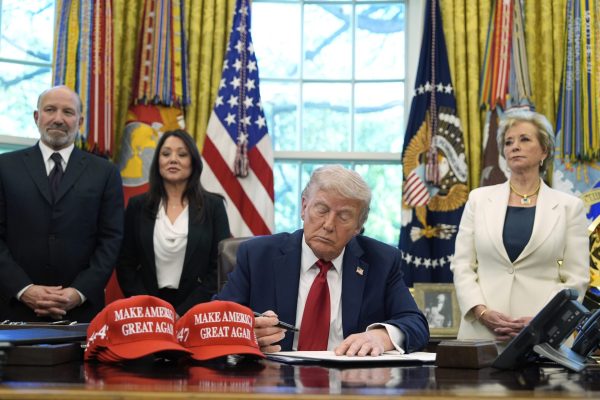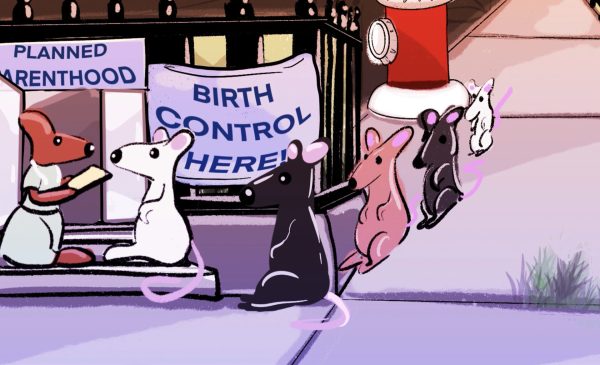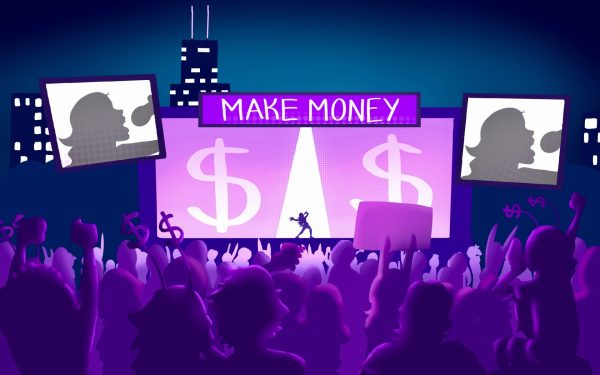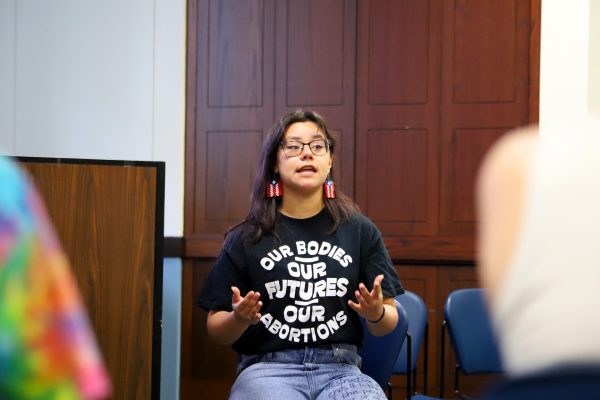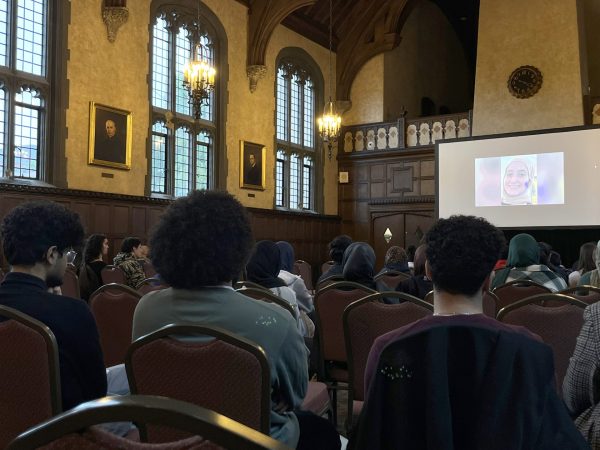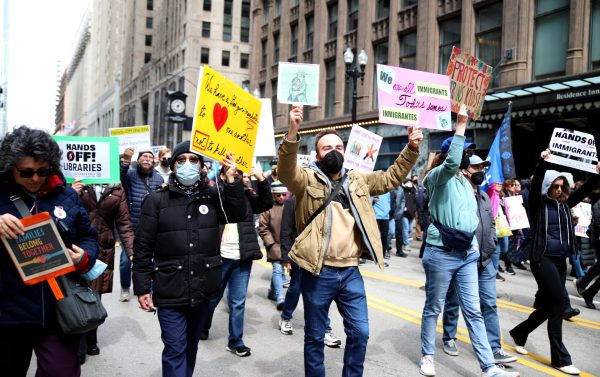‘For all the people, for all of Chicago’: People’s Unity Forum focuses on violence prevention, housing, public safety for upcoming election
Credit: Jonah Weber
State Rep. Kam Buckner speaks to the crowd during the People’s Unity Forum. Buckner’s campaign focuses on affordable housing.
Hundreds of people held up green flags as Marketta Sims, a grassroots leader from the Chicago Coalition for the Homeless, recounted her experience with homelessness.
“When people often think of people experiencing homelessness, they think of people who are lazy and don’t want to do better for themselves,” Sims said in front of a crowd of more than 200. “I’m living proof that it’s not true.”
Sims announced she will be graduating college in May with a 4.0 GPA as five mayoral candidates sat behind her.
“Finding a home was the key [to] saving my life,” she said. “It was the key for my emotional, mental, physical and spiritual wellbeing.”
Sims spoke at the People’s Unity Mayoral Forum on Thursday, Jan. 26 in Garfield Park hosted by Grassroots Collaborative. The forum was centered on people’s experiences connecting to key issues for the Chicago Mayoral Race in February 2023.
All nine mayoral candidates were invited to the forum, but only five were present.
Community activist Ja’Mal Green, Cook County Commissioner Brandon Johnson, State Rep. Kam Buckner, Ald. Roderick Sawyer and former CPS Superintendent Paul Vallas attended.
Incumbent Lori Lightfoot, U.S. Rep Jesús “Chuy” Garcia, businessman Willie Wilson and Ald. Sophia King did not attend, however, they were all present at another forum earlier that day.
The forum focused on six issues including, violence prevention, housing, climate, worker’s rights, education and public safety and health. Neighborhood and community organizations from the South and West sides were invited.
Moderators Rousemary Vega, Raise Your Hand Illinois and Miracle Boyd, Good Kids Mad City all implemented a card system where attendees showed approval with green cards and disfavor with red.
Violence Prevention
Public safety continues to be a hot topic for Chicagoans, but attendees were focused on violence prevention and over-policing issues. Mark Clements, a Jon Burge torture survivor, opened up the discussion by describing how he still lives with trauma after his abuse in 1981.
“We need accountability, starting with reparations,” Clements said. “And we need them now!”
Arseny Acosta, a leader with Good Kids Mad City, asked the crowd to raise their cards if they themselves or someone they know had a negative experience with CPD in the past four years.
Nearly everyone in the crowd raised a card.
Acosta recounted legislation such as shot spotter and the gang database are ineffective toward reducing crime in Chicago. She continued with asking the first question of the night regarding how candidates will invest in public safety wisely.
“When we talk about public safety, the first thing we should not be talking about is police,” Green said. “Police cannot solve violence on our streets.”
Green said he was in favor of investing in youth apprenticeship and internships, trade and tech clubs in schools and community centers.
“There is no substitute for investing in long-neglected communities,” Vallas said.
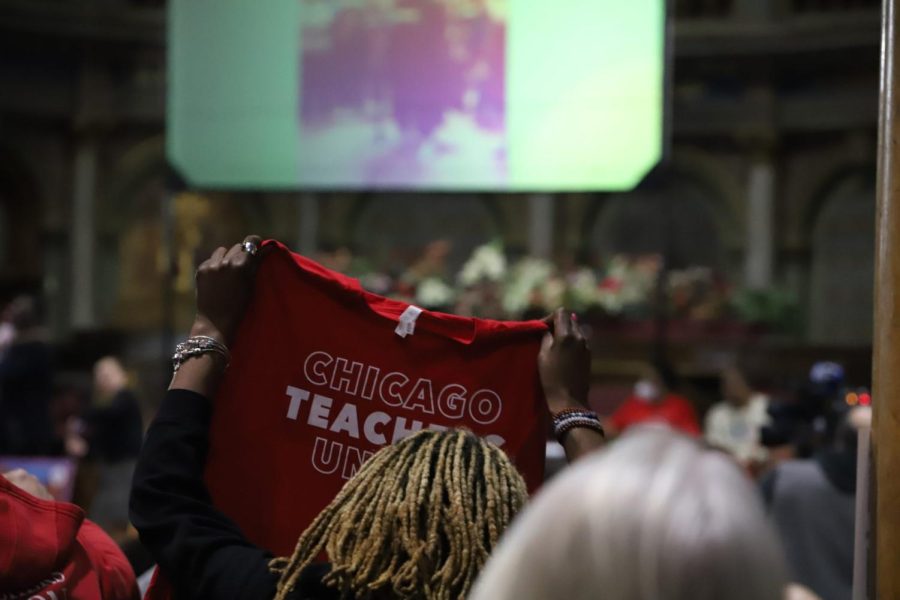
However, Vallas discussed different policing methods. He is in favor of community members joining CPD to survey their own community.
“Community supervised policing can be effective,” he said.
Vallas was met with silence and a wave of red cards.
At the end of the forum, each candidate was asked if they would pass legislation to distribute reparations for Jon Burge torture survivors after 1991 if they are elected.
All candidates said they would.
Housing
“Over 65,000 Chicagoans are experiencing homelessness in our county and we need you to take action,” Sims said while pointing behind her toward the candidates.
Brother Mike Eldridge, a member of Bring Chicago Home, asked the audience to raise a green card if they themselves or someone they know had experienced homelessness.
The entire room waved up a sea of green cards.
Eldridge asked what the candidates’ visions were to assure all Chicagoans to have stable and affordable housing amid rising rent prices.
“Housing is a human right,” Buckner said. “65,000 [people] in Chicago are facing housing insecurity, and we say we don’t have the money to figure it out. Tomorrow I have to wake up to argue with people on why I’m against spending hundreds of millions of dollars to keep a football team in Chicago.”
Buckner expressed his support for Bring Chicago Home, legislation that raises the real estate transfer tax and creates a revenue stream for affordable housing in Chicago.
Johnson said Chicago needed more than just Bring Chicago Home.
“We need just cause for eviction to protect families, expand the affordable housing ordinance and create a pathway to home ownership,” he said. “I’m the only person in this race who has presented a budget plan to make sure we are making critical investments, reducing our deficits and doing what is most important … to make sure Chicagoans can live in Chicago.”
In the lightning round, where candidates could only answer yes or no, Vallas and Sawyer were the only candidates to say they would not pass Bring Chicago Home legislation during their administration.
Public Health & Safety
Diane Adams from Southside Together Organizing for Power (STOP) recounted her mental health journey.
“In ‘96, my son was murdered and I fell into a deep depression,” she said. “Any parent who has lost their child due to violence can tell you that grief stays with you and you have to live with it. I received psycho-social rehab. It helped me learn my place in society again.”
In 2012, the city closed 12 mental health facilities, a third of them were located on the South Side, according to WBEZ.
“People like me deserve a voice in the kind of care we need,” Adams said.
The entire crowd raised their green cards when Cheryl Miller, an organizer from STOP, asked if they had experienced issues with mental health.
“That says it all,” Miller said.
The candidates were asked how they will invest in public mental health services and their stances on the city outsourcing help from private and nonprofit companies.
Johnson agreed to pass ordinance Treatment Not Trauma which involves reopening mental health facilities, creating a separate team of responders to crises and halting CPD from handling mental health crises.
Sawyer said that his other competitors will not get a chance to pass it.
“We’re going to get it passed before the end of this administration,” he said.
However, he expressed concern for opening facilities because of an insufficient number of professionals to hire.
“We’re having the biggest problem finding therapists, psychologists which are key to opening these centers,” Sawyer said. “We don’t have enough in the six centers we have right now.”
All five candidates promised to pass Treatment Not Trauma at the end of the night.
Candidates also promised to end sacrifice zones, transition to need-based enrollment for all CPS schools and pass the Rideshare Living Wage and Safety Ordinance by the end of their terms.
Early voting for the mayoral election begins Feb. 13.


